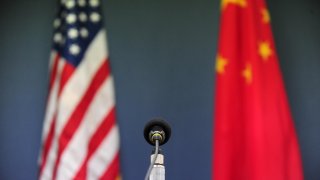
- "The nascent US-China détente is now in critical condition, if not entirely dead, and any future détentes would be similarly vulnerable to derailment by domestic politics," Gabriel Wildau, managing director at Teneo, said in a note.
- The U.S. Department of Defense said a U.S. Air Force fighter shot down an alleged Chinese spy balloon over the weekend.
- China's Ministry of National Defense and Ministry of Foreign Affairs both called the U.S. move to shoot down the balloon an "overreaction."
BEIJING — U.S.-China relations look increasingly fragile, analysts say, after a now-downed Chinese balloon forced U.S. Secretary of State Antony Blinken to indefinitely postpone his trip to Beijing.
While the alleged spy balloon posed little actual threat, analysts pointed out the high level of public attention constrains how far leaders can act in pursuing gestures of stability. The two countries' presidents met for the first time in person under the Biden administration about three months ago, when Blinken's travel plans to China were first announced.
"The nascent US-China détente is now in critical condition, if not entirely dead, and any future détentes would be similarly vulnerable to derailment by domestic politics," Gabriel Wildau, managing director at advisory firm Teneo, said in a note.
Get a weekly recap of the latest San Francisco Bay Area housing news. Sign up for NBC Bay Area’s Housing Deconstructed newsletter.
"A key question is why the Biden administration decided to publicize this balloon but not previous [reported] ones," Wildau said. "The answer remains uncertain, but we suspect that unlike with previous Chinese balloons, US officials believed this one would inevitably be discovered by the public even absent official confirmation."
U.S. government representatives did not immediately respond to a CNBC request for comment on the decision to disclose the balloon's existence to the public.
Money Report
The U.S. Department of Defense said a U.S. Air Force fighter shot down the balloon over the weekend, after initially deciding not to while the balloon was over U.S. land. Majority Leader Chuck Schumer announced a classified China briefing with all senators will be held on Feb. 15.
"Schumer revealed that we do know that once the balloon was exposed to the public, China attempted to maneuver the balloon to leave the U.S. as soon as they could," a Senate Democrats press release said Sunday.
China's Ministry of National Defense and Ministry of Foreign Affairs both called the U.S. move to shoot down the balloon an "overreaction."
"What the U.S. has done has seriously impacted and damaged both sides' efforts and progress in stabilizing China-U.S. relations since the Bali meeting," China's Vice Foreign Minister Xie Feng said, according to a public statement released Monday in Chinese, translated by CNBC.
The foreign ministry said in multiple statements that the "airship" was primarily for weather research and "deviated far from its planned course" due to wind and forces beyond China's control.
While discussion of the balloon — including memes — circulated on Chinese social media, China's official Chinese-language mouthpieces have been more muted so far. A state-broadcast nightly news report on Sunday did not mention the balloon was shot down.
"Both sides understand the challenges," said Dali Yang, political science professor at The University of Chicago. "We do get the public communication and presumably there is an undertone of regret on both sides on how this situation has developed."
"I get the sentiment also really there is this effort to make up for lost time by China," Yang said. "That alone would mean the Chinese leadership would be more restrained and would not want to let this balloon situation blow out of proportion."
In the last several days, both countries have emphasized the need to communicate, and done so at a high level.
Blinken spoke Friday with Wang Yi — China's former foreign minister who was recently promoted to a more senior diplomatic role — according to readouts from both countries.
While Blinken said it wouldn't be appropriate to visit Beijing at a time of "clear violation of U.S. sovereignty and international law," he would travel to the Chinese capital as soon as conditions allowed, according to a statement from U.S. Department of State spokesperson Ned Price.
However, analysts say too much has changed already for the situation to easily revert to where it was before the balloon incident.
"Last week's Balloon Crisis will have a significant impact on bilateral relations and certainly U.S. public opinion, political debate and policies toward [China]," Roman Schweizer, managing director for aerospace and defense at Cowen and Company's Washington Research Group, said in a report Sunday.
"Countries spy on each other — on enemies and friends, using all sorts of methods and tech. Getting caught is the risk," Schweizer said. "The Balloon Crisis has likely embarrassed the PRC enough that they will seek to retaliate, change the narrative or, simply put, make the U.S. look bad somehow."
On the U.S. side, he expects the Biden administration will be "pressured to get tougher." He pointed to the administration's export controls targeting Chinese tech and potential limits on U.S. investment in China, as well as new developments from the House Select Committee on China.
U.S. public sentiment
In newly elected U.S. House of Representatives Speaker Kevin McCarthy's first big bipartisan win, members from both the Democratic and Republican parties voted overwhelmingly in January to establish the House Select Committee on the Strategic Competition Between the U.S. and the Chinese Communist Party.
It remains unclear whether McCarthy will visit Taiwan, as his predecessor did in August, drawing the ire of Beijing. Taiwan is a democratically self-ruled island that Beijing considers part of its territory.
More than half of Americans agreed the U.S. should continue to have high-level politicians visit Taiwan even if it harms bilateral relations with China, Pew Research said in October.
"Over the last several years, an increasingly large majority of people in the U.S. have an unfavorable view of China" amid concerns about China's policies on human rights, its partnership with Russia and other factors, according to Pew Research.
Michael Hirson, head of China research at 22V Research summed up the impact of weekend events on U.S.-China relations in a tweet:
"The balloon episode is simultaneously amusing and worrying because that's the stage of the US-China relationship we've entered: absurd and also dangerous."
— CNBC's Michael Bloom and Christina Wilkie contributed to this report.






